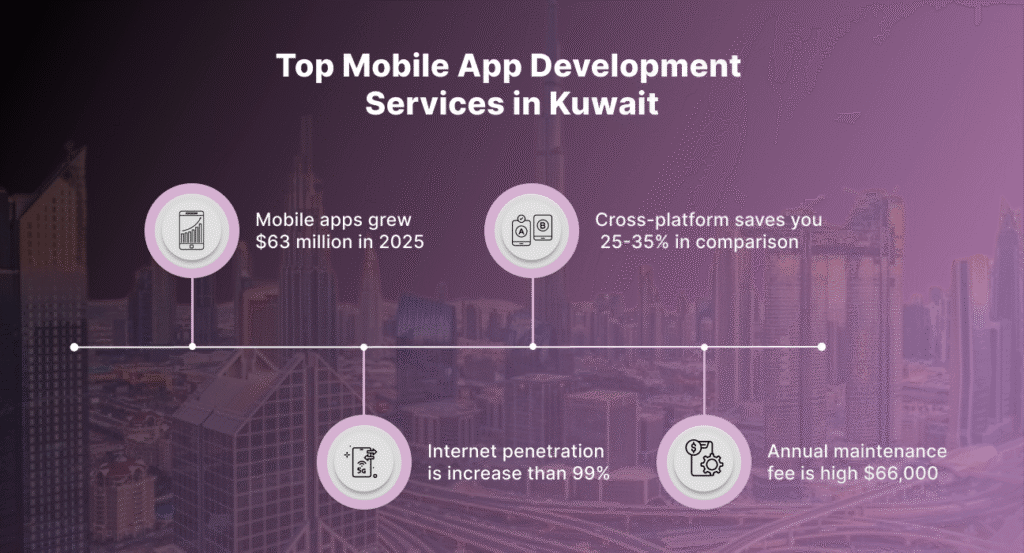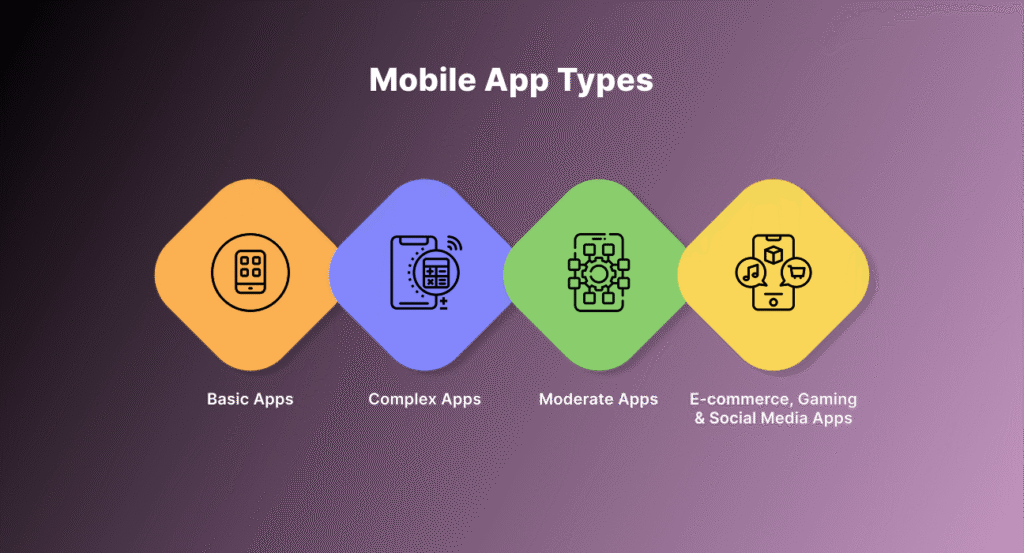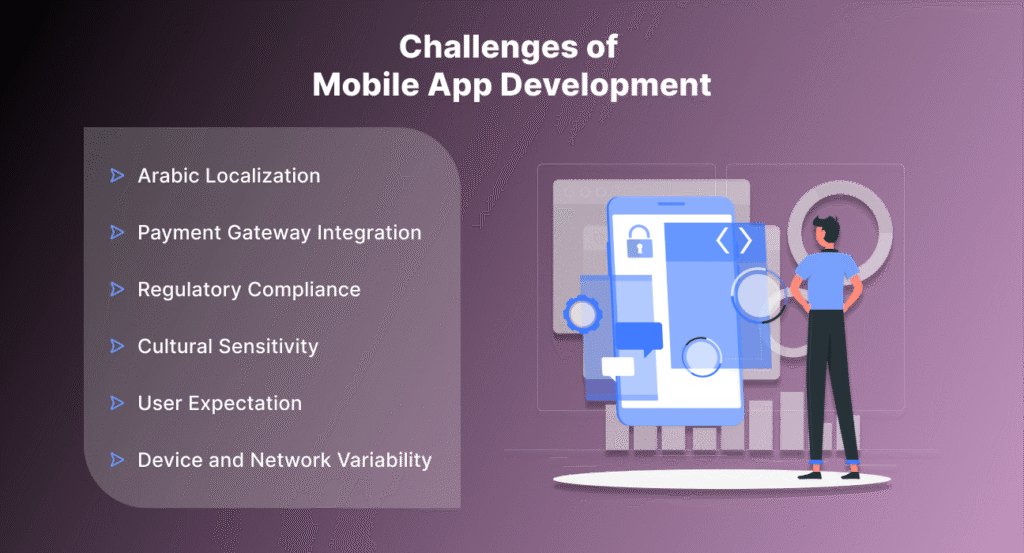

Kuwait’s mobile app development market is influenced by fast-changing digital trends, local market needs, and a variety of metrics to impact cost. The average cost of developing mobile apps in Kuwait ranges from KWD 2,500 for basic mobile apps to well over KWD 20,000 for expensive, customized mobile app solutions. Cross-platform mobile app development can be lower-cost for startups and SMEs. Let’s explore in depth:
Kuwait’s Mobile App Economy
Kuwait is a well-connected market with 7.78 million cellular connections, 4.94 million internet active users as of 2025, and 99% internet penetration. Mobile app development expects nearly $63 million in economic value in 2025, with expectation of reaching $72.43 million by 2030, as we see greater tech adoption across sectors and businesses including finance, healthcare, e-commerce, education, logistics, etc. Technology trends including AI/ML, IoT, and 5G-enabled experiences are contributing to drive custom mobile app solution demand in Kuwait, and mobile app development should serve as a primary tool for business competitiveness and business digital transformation ventures.
Stats And Trends

- The revenue from mobile applications in the market in Kuwait will grow to around $63 million in 2025.
- Internet penetration is more than 99%. The use of smartphones is mostly universal.
- While app complexity, design, compliance, regulatory, and localization work pay for the vast majority of costs.
- Cross-platform mobile app development can potentially save you about 25-35% in comparison to native mobile app development.
- Annual maintenance fee and updates for complex apps could get as high as $66,000.
- Marketing and launch expenses could account for 30-60% of your total budget.
Cost to Develop Mobile Apps: How Much & Why?
Costs for mobile app development in Kuwait are determined by many factors: app complexity, native platforms, app features, backend integrations, etc. Instead of pricing a lot of estimates, here is a ballpark figure:

- Basic Apps (apps with limited functionality, potentially called MVP or informational apps, also considered basic apps) usually cost about KWD 2,500 to 5,000 and take 2-4 weeks to develop.
- Moderate Apps (additional functionalities such as payment gateways, user authentication) would cost about KWD 5,000 to 10,000 and take up to 3 months.
- Complex Apps (greater functionality, custom integrations, or heavy backend) could exceed KWD 20,000 and may take more than 6 months.
- E-commerce, gaming, and social media apps are generally higher due to the amount of customization and data handling standards, and cost upwards of KWD 25,000-200,000.

Image: Mobile App Development Costs by Complexity in Kuwait (KWD)
Platforms of Mobile App Development
The type of platform selected has a significant impact on the cost and scope of the mobile application development project. Companies have two options in mobile application development: native development (building iOS and Android applications separately) or cross-platform mobile app development (using a cross-platform mobile app development framework like React Native, Flutter, or Xamarin).
1. Native Development (iOS and Android)
Native mobile application development requires separate mobile applications for iOS and Android using native mobile programming languages such as Swift and Kotlin, respectively. Many companies in Kuwait and the region prefer native mobile app development, especially in the premium markets, when user experience and performance matter the most e.g., luxury brands, banking, and exclusive retail.
By nature, native applications can take advantage of the features and capabilities provided by the platform, and as such, the native applications are better integrated and faster; however, the implicit disadvantage is that they require separate codebases, so all associated development and maintenance costs will be effectively doubled.
Further, companies will require skilled native developers in the region largely due to the expectation of a high standard in terms of design and security requirements associated with mobile applications in Kuwait.
2. Cross-Platform Mobile App Development
Cross-platform development, where you can utilize a framework like React Native, Flutter, or Xamarin, allows the same code base to be deployed on both major platforms. In Kuwait and the region, computer start-ups and SMEs often work in this way, as it is faster, more efficient, and can save up to 35% of the cost, generally. This is ideal for apps supporting UI components and unique bilingual Arabic English translation apps. However, natively developed and the most complex apps or those needing deep access to hardware, may require native development. Overall, the ability to go to market quickly and effectively with quality components can be utilized with cross-platform products.
How Your Platform Selection Can Affect Development Cost?
A decision of the platform will have a direct influence on cost, and project scope in Kuwait. Most companies targeting a wide audience through their app on both iOS and Android, and those that use native development, would require a budget jack up to double the quoted amount, and a timeframe would also be lengthened.
Working with cross-platform applications limits app delivery timeframe, and ensures costs are added to the customer as quickly as possible. Often the development projects outsourcing destination region is India or southeast Asia, where there is access to good teams and experienced development teams that are cost effective.
The strategic process for evaluating a platform needs to reflect the performance, reach, and a business’s conception of cost from Kuwait.
Key Factors Affecting App Development Cost

- Complexity and Features: More complex features (real-time messaging, geolocation, payment gateways like KNET) add complexity and costs. Backend development, cloud hosting, admin panels can increase budgets by as much as 20-35%.
- Designing Requirements: Custom UI/UX for Kuwait like right-to-left (RTL) layouts and bilingual text (Arabic/English), quality graphics, and interactivity will impact these costs. User expectations are high and require polished and attractive interfaces.
- The Location of the Development Team: Local (Kuwait development) can result in drastically different hourly rates as opposed to outsourcing to places like India (Kuwait: KWD 30-50/hr, India: KWD 15-25/hr).
- Security and Regulatory Compliance: Ensuring data security and adhering to regulatory compliance related to ICT regulations and privacy in Kuwait is a necessity, especially so for apps regarding fintech, payment, and/or health care. Legal and compliance costs can be a portion of mobile app development costs, at maximum 12%.
Building Custom Mobile App Solutions
The biggest factor you need to consider before you can build a custom mobile app in Kuwait is how the developers will approach your project. To help you understand, let’s examine the steps developers in Kuwait generally follow when developing custom mobile apps: complete some market research, perform a requirements analysis, select your mobile app development framworks, customize your UI/UX designs, develop your components, setup your backend (local Kuwaiti bank, payment systems like KNET), quality assurance/testing, and lastly, compliance requirements. The process will go through stages: discovery, design, development, backend, quality assurance, launch, and supporting and maintaining.
Cross-Platform vs. Native Development
Cross-platform mobile app development is becoming more popular in Kuwait for startups and SMEs with limited budgets. Cross-platform mobile app development allows you to quickly get your app in the market and requires less maintenance because a robust UI framework is adopted, as well as being a more viable option that considers the bilingual needs of Kuwait. Although, representatives who require high end, luxury apps, and performance apps may still prefer native development. Particularly if they have the budgets to pursue both native and cross-platform development in parallel.
The Challenge of Mobile App Development in Kuwait
App development for mobile platforms in Kuwait, presents a variety of challenges, including:

- Arabic Localization: Applications must support right-to-left layouts, and language that is culturally appropriate.
- Payment Gateway Integration: Localized payments systems (KNET) require unique integrations.
- Regulatory Compliance: Kuwait has stringent rules that govern all ICT activities and Data Protection laws.
- Cultural Sensitivity: Ensuring that the content is supportive of local norms (particularly highly conservative norms).
- User Expectation: Users expecting the fastest performing app possible, without glitches and an awesome UX/UI, along with customer support.
- Device and Network Variability: Considering different types of devices used, as well as variable network performance, will impact how you build applications.
Best Practices for Managing Mobile App Development Cost
Below are some of the best practices for you to follow for managing mobile app development costs in Kuwait. Check it out:
- Hiring Dedicated Mobile App Developers: You must look for developers who are familiar with the Kuwait market and its unique considerations is essential for affordable and compliant app development. They understand the cultural markets, language necessities, and ever-changing regulatory compliance to avoid potentially expensive blunders and costly re-work.
- Manage Complex Back-end Services: In managing expenses, companies will need to think about the complexity of back-end services, cloud hosting, ongoing support, and regular updates or measures post-launch as these can lead to cost increases. It is worth remembering that the annual maintenance costs alone can be as much as 30% of the original development cost. The budgeting for this phase ensures your app has its longevity and resilience.
- Localized Solutions: Quality assurance and security testing are critically important for Kuwaitis. Users who download apps expect flawless function and respect their data privacy. As a rule, costs spent for QA can be as much as 30% of the overall project costs. Spending enough time and money on testing will help prevent negative user reviews, detect any potential issues before apps are rejected from app stores, and help eliminate later costs associated with fixes after launch.
- Marketing Cost: Lastly, while discussed last because it is a secondary expense during the design and development phase, marketing and communication should be budgeted for heavily. Launching and promoting apps can absorb as much as 60% of the initial cost of development. If you don’t build in marketing expenditure, it will cut down on user visibility, and any foreseen future chance of success, no matter how well the app has been built.
If businesses in Kuwait take all of this good practice into consideration they can minimize the costs of mobile app development while maximizing quality, compliance, and value out in the market.
Things To Consider While Developing a Mobile App in Kuwait
Below are the essential aspects to follow for developing a mobile app in Kuwait:
The process begins by setting goals and requirements, choosing platforms and technologies, hiring a talented app development team, and thinking about local design and testing.
If a company does not have internal capabilities, they should seek specialized mobile app developers in Kuwait or affordable cross-platform developers, whom they can outsource to.
Always start with a focused discovery and competitive analysis, then move through prototyping, development, integration and launch, while incorporating local feedback and ongoing local market testing.

Final Thoughts
Developing mobile apps in Kuwait requires a proper budget, technical knowledge and understanding of local market requirements. The best practices, choosing the right platforms, hiring experienced mobile app developers, and creating custom mobile app solutions, will help ensure that new apps are aligned for success in Kuwait’s competitive and innovative digital economy.
